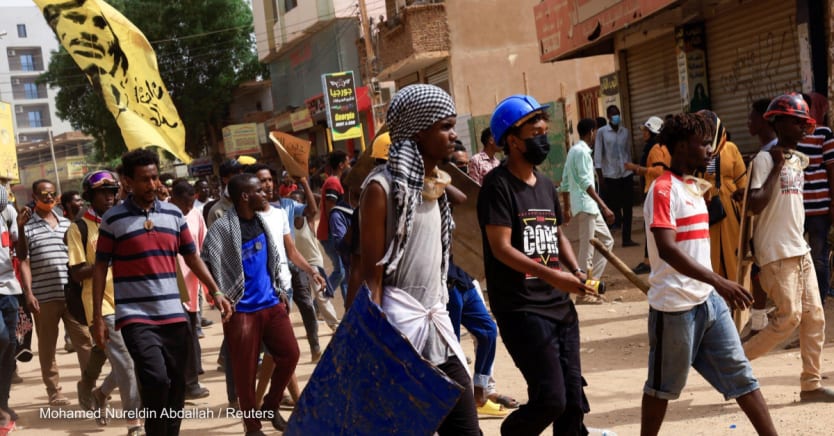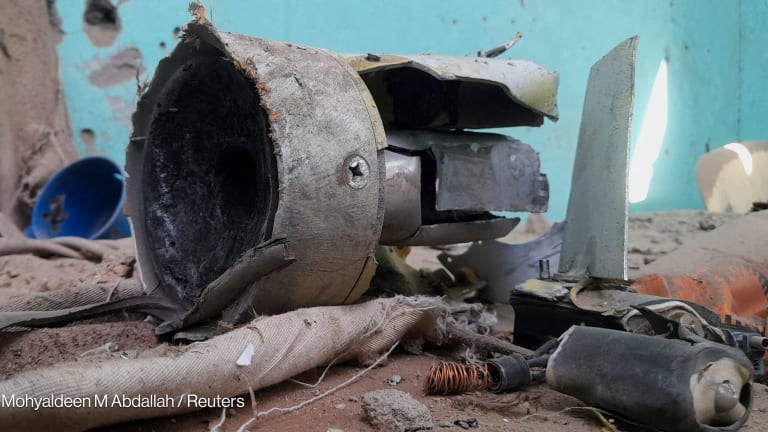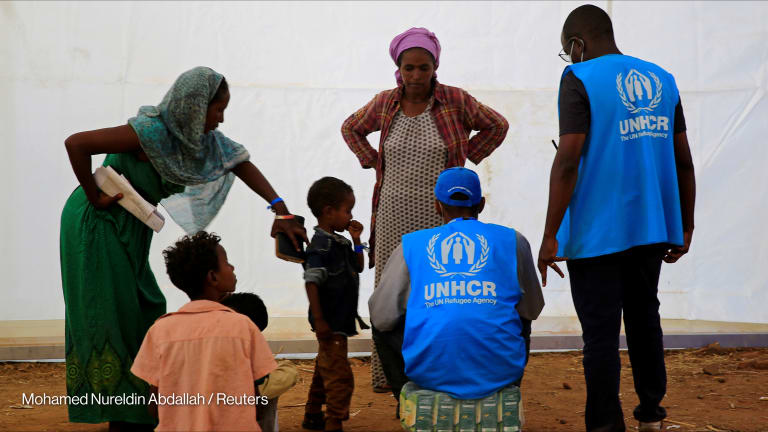
Sudan’s democratic fate is in the balance. Hundreds of thousands of Sudanese are in the street, risking their lives for peaceful change. Yet the world is not paying attention.
Massive protests are occurring throughout the country, despite the security forces’ regular use of live ammunition against protesters. The Sudanese are bravely doing their part. We should not fail them in their critical hour.
Top leaders in U.S. President Joe Biden’s administration and their counterparts in the U.K. and Norway — a group known as the Troika, which historically acted as mediators in Sudan — should press the current mediators, made up of the African Union, the United Nations, and the Intergovernmental Authority on Development, to give reinvigorated attention to brokering a deal that puts the country’s transition to democracy back on track. The consequence of failure is the crushing of a homegrown pro-democracy movement and a bleak future for the country.
In 2018-19, protests ousted longtime dictator Omar Al-Bashir, leading to an agreement between civilians and the military to form a transitional government headed by a civilian prime minister, Abdalla Hamdok, to guide Sudan out of international isolation and organize the adoption of a new constitution and elections. In October 2021, the military walked away from that arrangement, arresting Hamdok and seizing power.
Sudan’s transition can still be saved. That would steady the Horn of Africa, which is facing widespread famine, and would be a victory for democracy.
—But the popular movement will not go quietly. Khartoum has seen waves of protests against the military throughout the summer. Largely organized by resistance committees — the grassroots groups that spearhead the opposition to the military — the protests are a determined effort to end the military rule. Many resistance committees are composed of youth, who represent over 60% of Sudan’s population.
Meanwhile, the country is on the verge of collapse. No politician dares become prime minister, lest they be shamed for collaborating in the coup. International financial relief has been suspended, inflation soared by over 300% last year, and the number of Sudanese affected by food insecurity is expected to reach 18 million next month. Children are starving to death and a full-blown hunger crisis is looming. Escalating violence, as seen in several areas including the Blue Nile region, is just one consequence of the current political stalemate.
What is needed quickly is a clear, viable roadmap to civilian government and elections.
We propose three steps:
Children bear brunt of health crisis in Horn of Africa drought
As the region deals with the worst drought in four decades, children are suffering from widespread malnutrition and preventable diseases.
First, recognize the centrality of youth in the search for solutions. Make no mistake, they are the civilian political force. Given their dominant role, resistance committees must be involved in a negotiated solution that restores their main demand: Civilian rule. No political leader today can sign off on a negotiation without the approval of resistance committees, or the “street,” as they are often known. For that to work, the committees must have a voice not only in the street but in the negotiating room.
But the committees have been sidelined in the negotiation process or have boycotted it, refusing to legitimize the coup-makers and distrusting what they view as quick fixes pushed by politicians and diplomats. A formula is needed that allows for resistance committees’ participation while still respecting their principles.
They could, for example, serve as watchdogs without participating directly in negotiations. Or an international conference could be organized to gather their views, which would then be inputted into talks. Or they could form a parallel body that is briefed by the mediators and provides feedback as negotiations unfold. Other creative options to ensure their involvement should be explored.
The often-heard notion that resistance committees are too internally diverse to select representatives or voice coherent views is false. Having worked with youth and resistance committees throughout Sudan since 2018, we know that they are able to delegate representatives for discussions, provided the correct forum exists. If there is the will, there is a way.
Second, international mediators should focus on a true civilian-to-civilian dialogue, with the aim of reaching agreement on a government as soon as possible. On July 4, the leader of the junta, Abdel Fattah al-Burhan, announced that the military would remove itself from negotiations, allowing civilians to form a government. The military would, he said, confine itself to a defense and security council.
The problem is that armed movements — former rebels that signed a peace agreement with the government in October 2020 — anticipate participating in this process, likely steering it in the direction of their new ally, the military. Such machinations would almost inevitably cause delays and give the false impression of civilian in-fighting, providing the military a pretext for remaining in power. Armed movements should be excluded from the negotiations around the formation of a new government, which should be reserved for purely civilian stakeholders to reach agreement quickly on the transitional government.
To make this acceptable to the military and its surrogates, assurances that the transitional government, given its temporary status, would not pursue criminal prosecutions against military figures will have to be offered. International financial institutions could contribute by establishing a process of restoring relief, forgiving debt, and creating other aid mechanisms based on milestones in the transition.
Finally, in the medium term, a national conference that includes political parties, civil society, armed movements, and the military needs to set a timetable for adopting a constitution, holding elections, and carrying out other reforms. The conference would also need to agree on plans for justice for the crimes of the Bashir era and since.
Sudan’s transition can still be saved. That would steady the Horn of Africa, which is facing widespread famine, and would be a victory for democracy. To do so will require top-level attention from the U.N.-AU-IGAD mediation, strongly backed by the Troika.
There is no time to waste. Sudan’s pro-democratic movement cannot succeed alone.
Search for articles
Most Read
- 1
- 2
- 3
- 4
- 5









